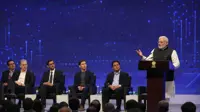The Narendra Modi-led government on Friday pledged Rs75,000 crore to support poor farmers and reduced the tax burden for the middle class, as it looked to rally support from voters with the final budget before a general election.
The Modi government, which kept inflation low and brought down the cost of borrowing, raised taxes on income and investment, but cut them on most goods you consume, however, is facing discontent over depressed farm incomes and doubts over whether his policies are creating enough jobs.
While the NDA government opened up access to amenities like power, toilets, roads, bank accounts and education for the needy and the poor, it couldn't do much for middle-class asset creation in equity and real estate and raise farm incomes on expected lines, over the last five years.
Heading to polls that are expected to be held by May and opinion polls suggesting that the ruling Bharatiya Janata Party (BJP) could lose its parliamentary majority, the budget was meant to shore up support in the countryside, where two-thirds of Indians live, and among the urban, salary-earning middle class.
The interim budget for 2019-20 offered direct cash support of Rs6,000 to 120 million poor farmers and allocated Rs19,0000 crore for a rural jobs guarantee scheme and rural development, like building roads and homes.
The government said it would launch a pension scheme for workers in the unorganised sector, which employs some 420 million people, as opposition promised the impossible.
The budget also proposed to reduce the tax burden for the lower middle class, by doubling the tax exemption limit to Rs500,000 from an earlier Rs250,000.
Acting finance minister Piyush Goyal said the measures announced on Friday were aimed at putting money into pockets quickly.
“This is not just an interim budget, this is a vehicle for the developmental transformation of the nation,” Goyal told the Lok Sabha while presenting the interim budget for 2019-20.
“India is solidly back on track and marching towards growth and prosperity,” said Goyal.
India was expected to expand 7.2 per cent this fiscal year, Goyal said, keeping its slot as one of the world’s fastest growing major economies.
But despite the government’s bullishness over the economy, a report on the previous day said the government has been withholding an official survey that showed India’s unemployment rate at its highest in decades.
But, the big giveaways would increase fiscal slippage for a government that has been seeking to drag down its deficit. Yet, the budget puts the fiscal deficit for the year ending on 31 March only at 3.4 per cent of gross domestic product (GDP), slightly higher than the targeted 3.3 per cent.
But Goyal has projected that the deficit would come down to 3 per cent in both of the following two years. He is pinning hopes on better collections of GST and rising consumption.




















